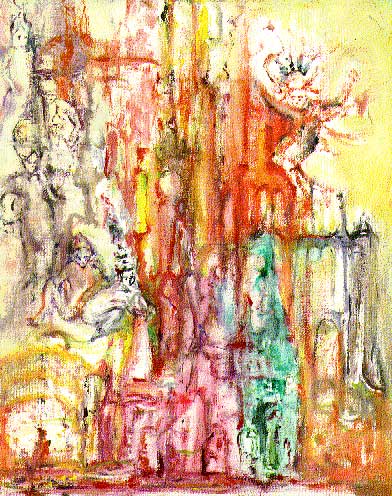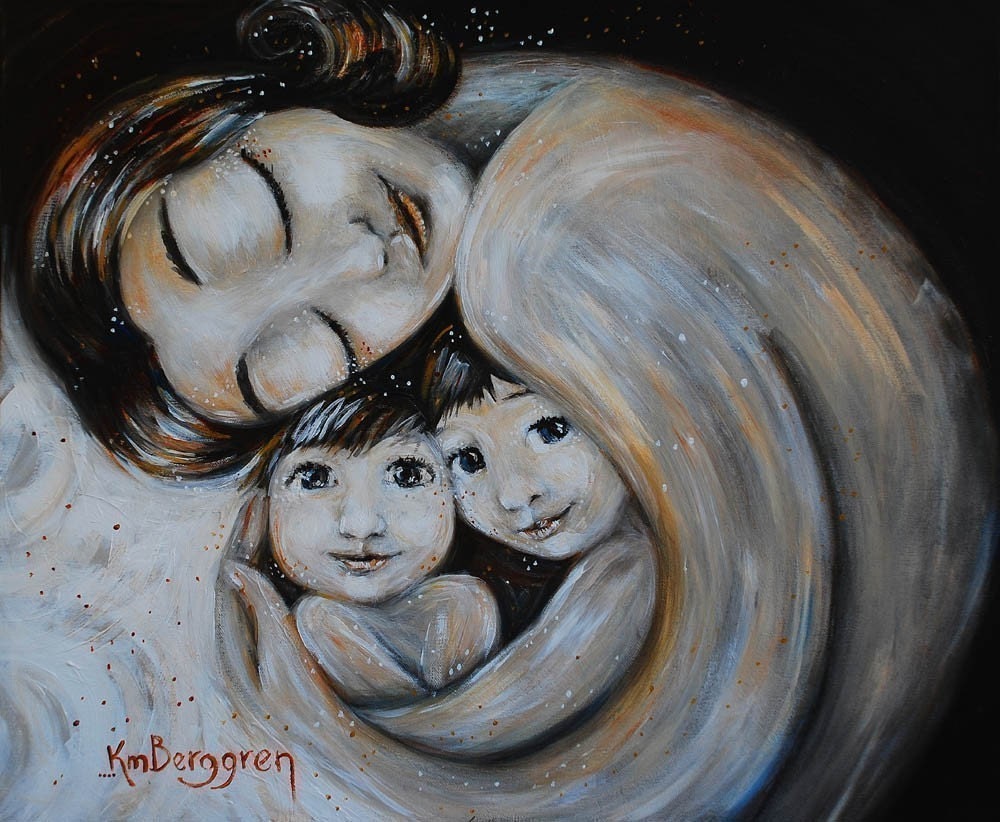What really fascinates me about the human experience is the ambivalence of it. Ambivalence seems to be a key buzzword in this course. I threw it out in my last blog and have encountered it in both the Frye and Zimmer readings. Ambivalence, or duality, seems to be the key in unlocking the mysteries of the Spiral (another obsession of mine), that strange symbol of existence and (lack of) time that has no beginning or end, and is in itself an on-going mystery. Very cryptic indeed, but there is a reason why I'm an English major and not a scientist.
Perhaps the ambivalence of both our earthly and dreamworld experiences is what produces the recurring themes of our literature. Metaphors of quests in mirror worlds teeming with opposites, twins, apparent as opposed to physical deaths, disguise and ambiguity all represent the duality of our experience. By the duality of human experience I mean our spiritual lives resonating from some other unknown plane of existence which we cannot fully comprehend while we are living on this physical one. The murmurs from this other world come to us through our dreams and we try to make sense out of these rustlings by echoing them in our literature. This is also what I meant when I said that we as writers and poets are but conduits to that other realm where the Ocean resides. When we dream are we not almost always on some sort of quest? I suppose I should not presume to know the nature of the dreams of everyone else, but I know that for myself this holds true. In my dreams I am always sojourning through strange worlds and more often than not, I am traveling with people or entities whom I do not know in my waking, terrestrial life. I feel as though I am trying to accomplish some task, but alas, it never comes to fruition, or if it does I do not remember it. And so I am left to believe, especially after a truly haunting vision (you know them when you have them) that it must mean something--something specific to me--and so I must hold fast to the feeling of that quickly ebbing vision, for eventually a feeling is all that will remain. These recollections are usually piquant in nature, instilling sentiments that are at once disquieting and exhilarating.
This duality is also at the heart of our life's experiences, at least it is for me. We quite simply cannot take the good without the bad; and maybe this was the inherent flaw in the single God's great biblical design, for I am inclined to argue that man's "tragic" fall from the paradisal state of the flawless garden was inevitable. As alluded to in my last blog, I am also inclined to argue that man never belonged in this atrium in the first place and neither did the plants or animals, as if our world and others that may potentially exist are merely static figurines forever ensconced in the Father-God's snow-globe collection. I have long believed that religion is nothing more than a social construct falsely rendered from misreading mythology. I believe the only separation between the sacred and the secular is an ideology imposed by some powerful past conglomerate that is no longer identifiable. I think this notion is at the heart of Zimmer's piece concerning a pagan hero and a Christian saint; I think this notion is at the heart of Frye's work as a literary critic; and I think this notion is at the heart of literature. It is but another ideology, to be sure; but it is a much more enriching ideology than the exclusive and oppressive one under which a large faction of society currently labors. I am hostile to this belief system because it attempts to remove the ambivalence of natural experience, as do the more vulgar of popular romance stories which is also why I'm hostile to them. During our descendant journey from childhood innocence to the jaded realm of adulthood we come to realize that black and white are only the ideals from which true life experience shades itself. There is not always a happy ending to our daily life's journeys, and so we come to appreciate them much more when we are graced with them.
 Conn-eda's journey is also a descent, a fall, from innocence. What I find particularly fascinating about this story is that the downward movement to the Fairy Kingdom is progressive rather than devolved. Zimmer writes: "Conn-eda is thus outgrowing his innocence. Such a childlike state of grace has to be surpassed through experience, and experience precisely of the intrinsically twofold, ambivalent character of everything that forms life's warp and woof. Such an awakening entails the peril of a loss of all faith in virtue and in the values of good--the peril of indifference or callousness to the distinction between good and evil and to their unending strife; or it may entail the opposite spiritual disaster--impotent despair, absolute disillusionment in man's capacity to realize the everlasting, great ideals"(37). And for me this is where the Sacred Scripture (as it has come to be ideologically and socially defined) failed for me. It was only through reading literature innately deemed secular that I awakened from my disillusionment, a state that was only deepened when I went looking for meaning in churches. But my truly personal apocalypse came once I learned to read that Sacred Scripture through a secular lens. The further down I go, with each trap door I open, the less I know and the more voracious I become. I don't want to return to the Garden, I don't want to be Job--piteous, naive fool that he was. I want to walk to and fro in the earth, and up and down in it. I want to walk the path of Conn-eda and maybe someday remember one of my visits to the Fairy Kingdom.
Conn-eda's journey is also a descent, a fall, from innocence. What I find particularly fascinating about this story is that the downward movement to the Fairy Kingdom is progressive rather than devolved. Zimmer writes: "Conn-eda is thus outgrowing his innocence. Such a childlike state of grace has to be surpassed through experience, and experience precisely of the intrinsically twofold, ambivalent character of everything that forms life's warp and woof. Such an awakening entails the peril of a loss of all faith in virtue and in the values of good--the peril of indifference or callousness to the distinction between good and evil and to their unending strife; or it may entail the opposite spiritual disaster--impotent despair, absolute disillusionment in man's capacity to realize the everlasting, great ideals"(37). And for me this is where the Sacred Scripture (as it has come to be ideologically and socially defined) failed for me. It was only through reading literature innately deemed secular that I awakened from my disillusionment, a state that was only deepened when I went looking for meaning in churches. But my truly personal apocalypse came once I learned to read that Sacred Scripture through a secular lens. The further down I go, with each trap door I open, the less I know and the more voracious I become. I don't want to return to the Garden, I don't want to be Job--piteous, naive fool that he was. I want to walk to and fro in the earth, and up and down in it. I want to walk the path of Conn-eda and maybe someday remember one of my visits to the Fairy Kingdom.


